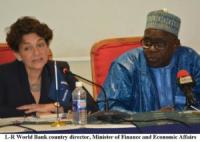The World Bank on Tuesday, July 11 2017, approved a $56 Million International Development Association Credit and Grant to strengthen the Gambia’s fiscal position while restoring the provision of Essential Public Services.
By Kebba Jeffang
Madam Lousie J. Cord, the World Bank Country Director said the assistance came following a visit of the World Bank Vice-President for Africa region in February, who discussed with President Adama Barrow, concerning possible interventions.
“I think the promise has been fulfilled since our board of executive directors have approved on June 30th, this $56 million Emergency Development Policy Financing (DPF), that we are pleased to sign today. We are all aware that the Gambia is a fragile country and the current economic crisis may threaten the success of the political transition. In this fragile situation with high risks involved, the World Bank has leaned forward to support the government and help build the conditions for a turnaround,” she said.
Mrs. Cord said through this emergency DPF, they aim to provide a rapid response to the country’s urgent financing needs but also to lay the groundwork for future, deeper structural reforms. She said the goal is to put the country back on a stable macro-economic path.
“Progress is being made. You have shown your commitment to improved fiscal and debt discipline by revising the budget for 2017 to better align expenditures with available resources. You have also successfully carried an audit of the civil service and security forces to address irregularities in the public payroll and limit waste of scarce resources,’’ she said, while showing appreciation to the government.
Mr. Amadou Sanneh, Minister of Finance and Economic Affairs, gave a rundown of the economic situation of the Gambia in 2016 and said Macroeconomic Developments in 2016 has been impacted considerably by the economic mismanagement and fraudulent practices of the previous regime.
Mr. Sanneh continued: “Economic growth in 2016 is now estimated to have reached 2.2 percent, markedly lower than the 4.3 percent growth in 2015, due to limited availability of foreign exchange, weak agricultural output and the effects of the political impasse on tourism during the high season. With erratic rainfall during the summer, some 90 percent of the groundnut cash crop will be lost according to the pre-harvest report. Headline annual inflation stood at 8.8 percent in February 2017, well above the CBG’s (Central Bank of the Gambia) target of 5 percent, driven by high food prices and the depreciation of the dalasi against the U.S. dollar. Net International Reserves have fallen to a precariously low level of only US$22.3 million in February 2017, less than one month of imports cover”.
Mr. Sanneh explained that in order to return to macro-economic stability, the government is committed to reforms that will restore the economy which include reducing net domestic borrowing to 1 per cent, by December 2017 compared to 11% in 2016.
“It is in this light that the Government engaged the World Bank Group for assistance through budget support. The World Bank has since then worked closely with the Government and this culminated in the World Bank Board’s approval of $56M as budget support. And we are delighted to be signing today this agreement for the Development Policy Financing,” he said.
He said this DPF will support the government in ensuring the provision of essential public services restore macro-economic stability and help shield the poor and vulnerable households from the impact of the ‘inherited’ economic crisis. He informed that the external financing provided through the DPF will go a long way towards reducing the costly domestic borrowing and ease the fiscal burden of high domestic interest payments.
Meanwhile, during the questions and answers session with members of the press, Mrs. Cord stated that 55% of the total of $56 million is credit payable within 40 years while 45% is a grant.
The minister for his part assured that with proper financial discipline and planning, the loan can be paid within the agreed timeframe. He admitted the already existing debt has swallowed the country but said taking credit is unavoidable giving the current economic distress affecting the operation of the country. He also confirmed that salary increment cannot take place in 2017 because the government doesn’t have the financial capacity to do so.

